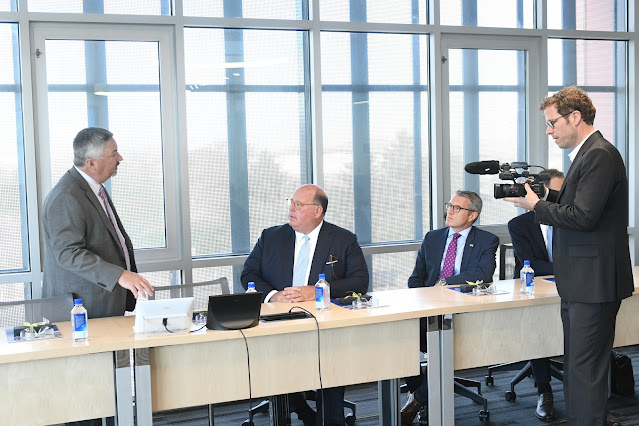
Salt Lake Community College is poised to be a model around the country for its unique workforce training partnership with Swiss-based Stadler Rail and Salt Lake City School District, according to Edward McMullen, U.S. Ambassador to Switzerland.
McMullen and other Swiss officials recently visited SLCC’s Westpointe Workforce Training & Education Center to hear David Schlaepfer, assistant to the CEO at Stadler, explain how the new Talent Ready Apprenticeship Connection (TRAC) program will work.
Stadler, which is expanding its rail car manufacturing operations with a new U.S. facility in the Salt Lake Valley, will need to hire hundreds of personnel from Utah’s workforce. TRAC partners, with support from the Governor’s Office of Economic Development, will tap into high schools to attract seniors interested in a career with Stadler as one of two types of technicians. Qualifying students will work half the time at Stadler and spend the other half finishing high school, emphasizing curriculum in math, physics, materials and drawing technology and engineering. The first cohort of 16 seniors will start the program this fall and eventually work on finishing production of electric rail cars that will replace diesel trains currently used for California’s Caltrain system.
Once finished with high school, students will continue their training and education with Stadler and SLCC, switching to about 70 percent work and 30 percent school. In the third year of employment with Stadler, the ratio moves to 80 percent work to 20 percent school, which culminates with an associate of applied science degree from SLCC. The curriculum and those specific work/school ratios, Schlaepfer noted, follows a successful method used throughout Switzerland to train young workers there.
During their senior year in high school, students in the TRAC program can expect to make $10 per hour or about $800 a month. They move up to $11.50 per hour and then $13 per hour by the second and third years in the program, eligible for bonuses each year. Once fully employed by Stadler, graduates of the program are projected to earn about $3,800 per month, excluding bonuses and benefits. There will also be opportunities to continue on for a four-year degree with tuition assistance from Stadler.

McMullen said the challenge in generating interest in the TRAC program, as well as other workforce development programs in states throughout the country, is changing popular public perception that the only path to a successful, well-paying career is through a university.
SLCC Provost, Dr. Clifton Sanders, added that the kind of technology-based training and education students receive at Westpointe, or the “T” in STEM (Science, Technology, Engineering and Mathematics) is “undersold” and is really the connective element for many workforce careers, including those that can be found with Stadler. Partnerships like the TRAC program, he said, are reflective of “where the culture of education is and should be going.” Sanders added, “Community colleges sit at the interface between yesterday and tomorrow.” Rick Bouillon, who started SLCC Division of Workforce & Economic Development, said of the convergence of the TRAC program and the newly opened Westpointe facility, “…really, the timing couldn’t have been better.”

